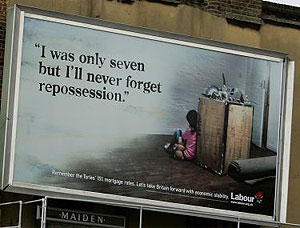Last week, I felt the need to take things easy and basically stay off the interwebs; I just needed a bit of a break. I should be back up to something like half speed this week and full speed in the new year.
There's plenty to talk about but I can't resist highlighting
Martin Kettle's extraordinary defence of Blair from Saturday's Gran, not least because I'm certain that it reflects Blair's own justification for his behaviour. Most of this has been pointed out in the comments to the post already - I found the mostly calm way that Kettle's "arguments were systematically demolished to be source of optimism for the future - but I still feel the need to join in.
Kettle, you see, thinks the problem is with us, not Blair. If you've not read this, make sure you're not drinking anything before you continue.
The issues of the week exemplify what's wrong. Yes, it is embarrassing that a serving prime minister should be questioned in Downing Street as part of a criminal investigation into political donations. And yes, part of the issue lies in the way Blair leads his party and his government. But the fundamental failing is not his. As a country and culture we have not worked out an open and fair system of financing necessary political life in a rapidly changing world. We wish for the end, but persistently ignore the means. Yet with a general election to fight in 2005, the parties had to act. The rest of us can afford to hold our noses. The parties needed big money in the bank. In that sense, Blair is a victim of our collective failure, not the perpetrator of his own individual one.
I did warn you. Don't blame me if your monitor is now dripping with coffee.
I don't know exactly how close Kettle is to Blair, he does occasionally criticise our dear leader, but this could just as easily have been said by the man himself. "We have not worked out an open and fair system of financing necessary political life in a rapidly changing world." You can just about hear him say it. The "argument" could be picked apart - for example, Kettle's claim that the parties
needed big money in the bank is clearly untrue - but the underlying principle is one of personal responsibility. Or rather the lack of it.
And it's an irony indeed that the Blair government, the one which
said "we need to be clear that the breach of an Asbo is not the failure of the Asbo, but the failure of the individual to abide by its conditions" (hat tip - redpesto in a comment to a previous post), would consider such a defence of their own actions. When their systems fail, individuals are personally responsible. When they fail, society is to blame. The idea that a teenager who breeches an ASBO is a "victim of our collective failure" is no go area. Blair, however, the man who promised to be "purer than pure", is exclusively able to use such a defence after deliberately flouting the laws he himself introduced as part of his campaign to clean up politics. He alone is allowed to be "a victim of our collective failure". It is risible in the extreme.
Kettle also takes on the quashing of the investigation into BAE Systems and the House of Saud.
Yes, it is humiliating that a multi-million pound corruption investigation should be pulled in the interests of keeping onside with the Saudis. Lord Goldsmith's announcement that the rule of law at home has to be sacrificed to our failing foreign policy entanglements will haunt him - though he also says, and it can't be merely ignored, that he thinks a prosecution would fail. The whole saga underlines that close relations with the House of Saud come at a price - which others remain happy to pay - that is neither politically perverse nor materially trivial. Oil supplies matter. Middle Eastern peace, stability and security matter, even though, Lord knows, we get these things badly wrong. Defence contracts and jobs matter too. It is too easy to brush aside the complex web of practical issues as if they are of no account. Ministers do not have that luxury.
Kettle doesn't dwell on the fact that part of the price of support for the House of Saud is exactly that it played a large part in provoking the terrorist threat which we now apparently need their help to deal with. Bin Laden's main gripe has always been with the House of Saud; more than any other reason, it is U.S. and U.K. support for that corrupt regime which originally put us in the firing line.
Terrorists should not be allowed to dictate our foreign policy, of course. (That is, though, exactly what Blair has allowed to happen. It's called the war on terror.) We should not refuse to support the Saudis simply because bin Laden doesn't like them. The fact remains however that our support for this regime, a regime which routinely uses torture, a regime which imposes a strict religious code on its citizens (but not on the ruling family), a regime whose citizens cannot be said to be free in any meaningful way, destroys any credibility that the rhetoric of the "war" on terror might have had. Bin Laden is wrong about almost everything but when he calls our government hypocritical, he's right on the button.
Kettle does warn that "defence contracts and jobs matter". On that same issue, after the announcement, a Labour MP whose name I can't quite remember, toured the studios giving it plenty on the danger of risking British jobs over this and congratulating the government for taking the right decision. I call this the "gas chamber defence".
Boss: Good news Number Two! We've just been given a big contract to build shower chambers in detention centres. The factory won't have to close after all.
Number Two: That's great news!
Boss: It is. Have a look at these plans. There's going to be lots of work there. We might even need to take on more employees.
Number Two: Excellent... er, hang on. Why do they want gas pipes installed instead of water pipes?
Boss: What? Oh, I don't know.
Number Two: But Boss, these chambers look like they're for killing people, not cleaning them.
Boss: Look, this is about jobs. OK, these might not be shower chambers but if we don't take the contract, someone else will.
Number Two: But Boss, I'm not sure that this is right...
Boss: For goodness sake, pull yourself together man. Would you rather be unemployed? Would you rather the contract went to the French?
Number Two: No Boss.
Boss: Good man. Now, go see how many gas pipe fitters we've got on the payroll.
Just to be clear, I'm not suggesting a direct equivalence here. The point is that when it comes to ethical considerations, the defence that it keeps people in work is a poor one. And I think it's safe to say that there are ethical considerations when it comes to selling extremely powerful weapons to corrupt non-democratic regimes.
It may surprise you to know that I do have some understanding of the need for pragmatism in foreign policy matters (it'd certainly surprise Kettle if he knew I existed). As a student of International Relations, I spent some considerable time studying
Realism, Machiavelli, Morgenthau and the like. It is sad but true to say that the underlying assumptions of realism, that nation states in an anarchic international system act aggressively and without ethics to defend what they perceive to be their national interest, remain valid to a large extent. It is less true in countries with a strong democratic tradition and post-war Europe demonstrates that there are other, less bloody ways for nations to interact. (This, by the way, is the reason why, despite its innumerable faults, I support our membership of the E.U. Those who do not may wish to consider what came before and ask themselves if it was better of worse.) Nevertheless, it would be naive to believe that Realism is not a defining feature of early 21st Century International Relations.
The question for democratic states then is, how do we react to this state of affairs? A complete abandonment of Realism is simply not possible. Given that hostile or potentially hostile countries still exist, it would be foolish to disband our armed forces completely and withdraw from mutual defence arrangements. If we did, sadly, there's a very real chance that another country would take advantage of that situation to promote their own national interest.
So what should we do? My own view is probably close to that held by Robin Cook when he talked of an "ethical dimension" to foreign policy. We should not abandon defence of the national interest but should act within ethical constraints to the greatest possible extent. Does that mean we shouldn't have any form of arms industry or military capability? No, it does not. Does it mean we need to be the world's
fourth largest exporter of military equipment in order to maintain one of the largest arms industries in the world? No, it does not. Cosy euphemisms aside, the country we live in is one of the world's leading manufacturers of the machinery of death. This simply is not necessary.
While accepting that much of the interaction between nation states still operates under an anarchic system where power counts above all else, we should attempt to promote international frameworks, laws and cooperative agreements which seek to lessen this state of affairs. The rule of law, domestically and internationally, should be supported at every opportunity. And, as the title of this blog suggests, carrots, rewards for those nations who join us in this endeavour and who adhere to basic standards of care for their citizens, should be given precedence over sticks, not the other way round as is now the case. Political violence, war, should be discouraged as a means of pursuing policy goals except as an absolute last resort.
I accept that none of this is easy and there will always been difficult and controversial decisions to be made. For example, is it better to cooperate with China, despite the government's refusal to grant political freedoms to its citizens, in the hope that engagement will stimulate change? It's a tough call and there are many more just like it.
One thing is for certain though. If the approach I've described above is the one attempted by the Blair government, they have failed.
Kettle, unsurprisingly, did not mention the
evidence given to the Butler Inquiry by Carne Ross which was also released on Thursday. That's the news the powers that be really don't want you to think about. By launching a war of choice based on a "determination to present available evidence in a different light", our government has given a new legitimacy to political violence as a means to pursue policy goals. The U.K. went to war out of choice, not as an absolute last resort; other governments cannot fail to have taken notice. And when these other government decide to start their own wars in "defence" of their own national interest, what legitimacy will our protests then have?
That will be the legacy of the Blair government. Rather than working to promote an international system in which cooperation between nations is rewarded and political violence is considered illegitimate in all but the most serious circumstances, the opposite has occurred. The system is now more anarchic, international laws and frameworks are less respected, and military power has been reinforced as the legitimate arbiter of disputes between nations. It is hard to imagine how this can possibly lead to anything other than a more unstable, violent world.
Tags: News, Politics, Sleaze, Saudi Arabia, Tony Blair








